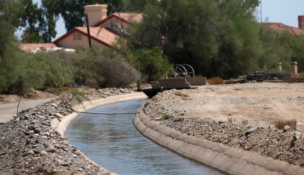World weather records tracked by ASU professor
Arizona Capitol Reports Staff//October 12, 2007//[read_meter]
World weather records tracked by ASU professor
Arizona Capitol Reports Staff//October 12, 2007//[read_meter]
An Arizona State University professor now has the last word when it comes to whether a weather event is a world record.
Professor Randy Cerveny is now rapporteur of climate extremes for the United Nations’ World Meteorological Organization. He is overseeing the development of a world weather archive to establish an authoritative tracking and record of weather extremes.
Scientists hope the archive will help them understand weather patterns and climate shifts over time. A sharp increase in record-setting extremes could provide clues to the Earth’s climate shift.
Cerveny has already made sure one error in the world of weather was corrected. Officials in Cherrapunji, India, reported that 1,840 millimeters (72.4 inches) of water fell during a 24-hour period.
The finding was reported in The International Journal of Meteorology and would have been a record, had it actually happened.
Cerveny contacted the people who took the measurements and asked them what type of equipment they were using. He learned, in the end, that they had misplaced a decimal point, and that 184 millimeters of rain had actually fallen. The 1966 record of 1,825 millimeters still stands.
Cerveny realized the need for a world weather archive when Hurricane Katrina hit more than two years ago. He said he kept hearing on television that Katrina was the worst hurricane in U.S. history.
That was wrong, and hearing the error again and again bothered him. The deadliest hurricane in U.S. history was the Galveston Hurricane of 1900, which killed at least 8,000 people.
The next year, Cerveny suggested that the World Meteorological Organization start a world archive to use to decide if weather is a record. “They said, ‘Great idea. Let’s do it. And you can take charge of it,’” he said.
Now, when a weather service believes it has a new record, it turns in a report to Cerveny detailing the findings and the measuring equipment used.
A volunteer committee of six weather experts then evaluates the report and makes recommendations on whether to accept the world record. Cerveny gets the final say.
The records are posted on a recently launched site hosted by ASU, http://wmo.asu.edu/.
“I’ve already been told by some people that (the archive) has settled some bar bets,” Cerveny said.
















